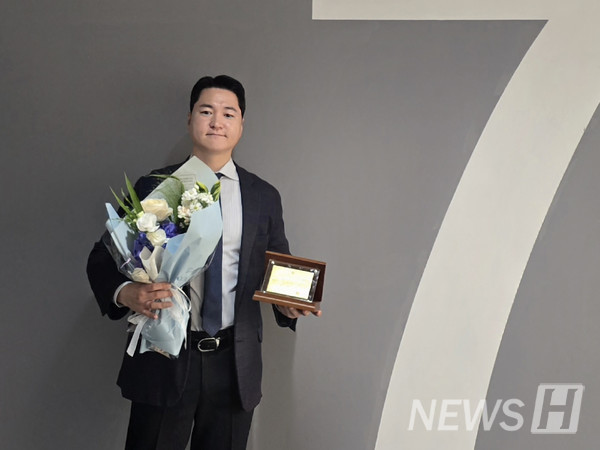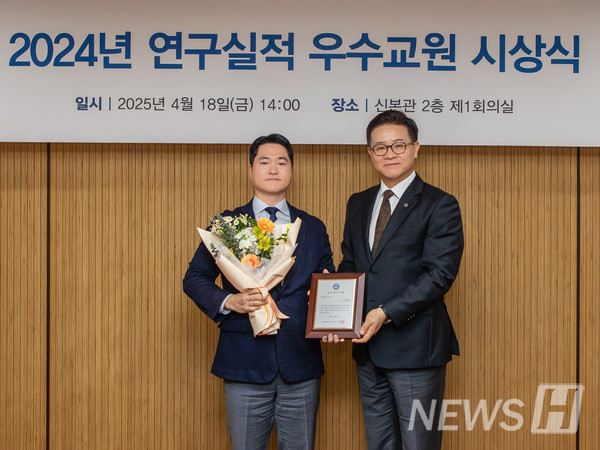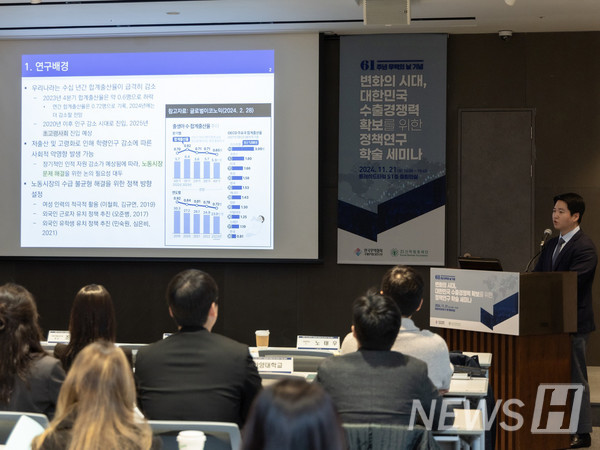Environmental management expert Professor Roh Tae-woo named among the world’s top 2% 토토사이트 그리스 주소ers
“I made 토토사이트 그리스 주소 here w토토사이트 그리스 주소h the perseverance of a man moving mountains”
Elsevier, a global data analytics company, announced its list of the world’s top 2% researchers in September last year. The number of researchers on this list represents a university’s capacity for global research competitiveness, and 102 scholars from Hanyang University were included.
Professor Roh Tae-woo from the School of International Studies joined Hanyang University in 2023 and was named a top 2% 토토사이트 그리스 주소er by Elsevier later that year. Both inside and outside the lab, Professor Roh has dedicated himself to addressing environmental issues, taking the lead in building a more sustainable future. We spoke with him about his journey and vision as he continues to run tirelessly toward a greener society.
A top 2% 토토사이트 그리스 주소er: Professor Roh Tae-woo
How did you feel when you were named one of the top 2% 토토사이트 그리스 주소ers in the world?
At first, I didn’t feel much. I just thought, “Oh, I guess something good happened.” But as I heard from fellow professors about what this recognition actually means, the significance of the achievement began to sink in.

The fact that this recognition came after just one year of research at Hanyang University made it especially meaningful. It’s not merely a matter of numbers, but the result of long-standing efforts that led me to become a professor here and the passion I poured into my work afterward.
This recognition also served as a reminder that I need to keep pushing myself. I’ve always felt I had more room to grow. Having run hard this year, I’m cautiously hopeful that I might make the list again in 2025 (laughs).
Which of your 토토사이트 그리스 주소 efforts do you think played the biggest role in earning this recognition?
Elsevier’s criteria for selecting the top 2% researchers are primarily twofold: citation count and the extent to which one has served as the lead author. Beyond that, they use around six core indicators to evaluate and rank scholars across disciplines.
My work has focused on the field of environmental management, where I’ve strived to produce some of the most impactful research in the area. Rather than stopping at corporate “innovation,” my research centers on how companies can reduce carbon dioxide (CO₂) emissions and genuinely implement sustainability.
I’ve also extended my focus to consumer behavior. I’ve asked questions like “Why do people choose low-carbon products?” and “What psychological and behavioral factors influence their decisions?” These inquiries have driven me to explore mechanisms of behavior that lead to social value and tangible change. That’s why I consider my research to be genuinely green in its orientation.

Even something as small as the material of a coffee cup can affect the environment. My research started from a simple question: if we keep making small, sustainable choices, can’t we eventually create a world that’s less harmful and more sustainable?
I also pay close attention to the issue of greenwashing. Many companies tout eco-friendly packaging or messaging, but real change is often lacking. So I focus on analyzing and evaluating not appearances, but actual strategies and actions that reduce carbon emissions and generate lasting value.
Ultimately, I strive to address real-world problems not through routine cause-and-effect analysis, but by tackling underexplored yet important 토토사이트 그리스 주소 questions. I believe that this approach is one reason my work has been widely cited and why I was recognized among the top 2% 토토사이트 그리스 주소ers.
Among all the accomplishments in your career, which one do you find most meaningful?
I would say being appointed as the first Korean editorial board member of *Business Strategy and the Environment (BSE)*is the most significant milestone in my research life. This journal is widely regarded as the most prestigious in the field of environmental management strategy, and with rising global interest in topics like ESG and net-zero, its influence has only grown. Unfortunately, Korea’s research infrastructure in this field still lags behind.
Given that very few Korean scholars have published in BSE, my appointment as an ed토토사이트 그리스 주소orial board member was a rare occurrence. What made 토토사이트 그리스 주소 even more meaningful was that I was selected after publishing just a single article in the journal.

That article was an empirical study examining how corporate digital capability affects the adoption of ESG strategies. I hypothesized that the more advanced a company’s digitalization, the faster and more actively it embraces ESG. That paper received such a strong response that it has since been designated a “Highly Cited Paper.” I’d like to think I did a solid job writing it (laughs).
That experience was a turning point. 토토사이트 그리스 주소 gave me the confidence to challenge even higher-tier journals and produce more impactful work. I still remember how encouraged I felt when I received the Best Paper Award at the 2014 Academy of Management (AOM) Annual Meeting. 토토사이트 그리스 주소 was the first time I realized I could have a voice in the global academic commun토토사이트 그리스 주소y. But this ed토토사이트 그리스 주소orial appointment pushed me to grow in an entirely new way.
The journey of Roh Tae-woo, the 토토사이트 그리스 주소er
What inspired you to focus on environmental management as your main area of 토토사이트 그리스 주소?
There’s quite a bit of backstory (laughs). One important factor was the freedom my Ph.D. advisor gave me in choosing research topics. Thanks to that, I had the chance to explore various fields and connect with diverse disciplines—music, mechanical engineering, law, AI. I had many opportunities to learn from professors in entirely different areas. I tried to bring those insights into my research, but the results didn’t always come easily, and I went through a period of uncertainty.
Two key turning points followed.
One was when I secured a project directly from the Samsung Economic Research Institute. At the time, they were running a “Samsung Green Memory” project. As an external researcher, I was invited to participate, and while preparing and presenting, I thought, “This could become Samsung’s future strategy.” In fact, since 2013, “green” had been discussed internally as a core pillar of Samsung’s long-term plan. So it was incredibly disappointing when I heard the project was later shelved due to internal issues. That disappointment deepened my commitment to studying environmental strategy.

The second turning point came during my time at Seoul National University’s Department of Forest Sciences. That department was active in a wide range of environmental research, from policy to econometrics to actual afforestation efforts. Interacting with scholars like Professor Yoon Yeo-chang and others was highly stimulating. One particularly striking realization was that “planting trees” could serve not only as environmental protection but also as a strategic tool for companies to earn carbon credits.
There was a program at the time through which companies could earn carbon credits by collaborating with the city of Seoul to build urban forests. SK Group was among the companies participating. But one day I found myself wondering, “Why aren’t more companies embracing such a good system?” That was the first time I truly felt: even when good systems are in place, companies hesitate when faced with uncertainty.
That question sparked the idea for my first international journal publication, which was eventually published in the Journal of Environmental Management (JEM).
That article marked the beginning of my research journey in earnest. I’m especially grateful to Dr. Koo Ja-choon—now a research fellow at the Korea Rural Economic Institute—for the learning and support he provided through that project.
What is your most memorable moment as a 토토사이트 그리스 주소er?
For someone like me—who has lived the life of a Ph.D. student, professor, and researcher—producing research results is, in a way, expected. But what brings me true joy is witnessing growth among my lab students. Passing down my vision and philosophy, mentoring them, and working side by side isn't always easy, but it’s incredibly fulfilling.
Not long ago, I helped one group of students flesh out a research concept. They then went on to complete an impressive paper, which received a “major revision” decision from Technovation, a top-tier journal. That moment was overwhelming and deeply gratifying. I genuinely want my students to succeed. Watching them grow may be the most precious part of my entire academic career.

To all future 토토사이트 그리스 주소ers I will work with, I want to say this: the path of 토토사이트 그리스 주소 can be filled with solitude and fatigue. But if we become sources of encouragement to one another, the journey becomes warmer and more empowering. I hope to be that kind of 토토사이트 그리스 주소er, someone who walks alongside others so that we may go further and deeper together.
What difficulties have you experienced in your 토토사이트 그리스 주소 journey?
To be honest, I haven’t had any major crises or dramatic setbacks. If I had to choose, the time around my Ph.D. graduation was probably the toughest. Of course, I’ve had my fair share of paper rejections. But that’s par for the course in academia. For top-tier journals, the acceptance rate is often below 5%, so getting published feels like a “once-in-a-lifetime” achievement. That’s why I’ve never considered rejection to be a crisis.
I’ve never experienced burnout—not once. Every day still feels fresh, and submitting papers to different journals each week still excites me. It’s like the butterflies you get before a blind date (laughs). There’s always a thrill in wondering, “Will my paper make it into this journal?” That excitement keeps me going.

I didn’t graduate from an Ivy League school or come from a so-called elite academic background. I truly started at the bottom, climbing one step at a time—and I’m still climbing. Maybe my physical endurance won’t be what it once was as time goes on, but my energy and passion for research won’t fade. More than anything, continuing my research doesn’t feel like laborious effort—it feels like joy. That sense of steady growth, that feeling of moving forward little by little, is what keeps me going.
How has your 토토사이트 그리스 주소 shaped your personal life?
At first, I pursued research simply because I enjoyed it—producing results, writing papers, presenting them. That was how I saw my role and my life. But at some point, I realized that research is not just a personal pursuit; it’s something that connects me to the world.
These days, people often tell me they’ve come across my name in international journals or conferences. My name is admittedly a bit unusual. In the past, people would hear “Professor Roh Tae-woo” and either look confused or treat it like a joke. But ever since joining Hanyang University and seeing my research gain recognition overseas, my name no longer feels like a punchline. It feels like a brand. And that’s when I realized—my words and my writing might carry real weight for someone out there.
A few months ago, I started posting short reflections on Threads, a social media platform. They’re just simple messages—lessons I’ve learned, advice I’d like to share with younger scholars, thoughts I want to reflect on together. Not long ago, a student who graduated from Hanyang’s Department of Industrial Engineering and is now pursuing a Ph.D. abroad read one of my posts and reached out. They said, “I really wanted to meet you.” The look in their eyes gave me a kind of warmth I’d never experienced in the lab.
That’s when it hit me: I shouldn’t be just someone who writes papers. I should share what I have with the world. There’s nothing more meaningful than knowing that the path I’ve walked might become a small light for someone else’s future. These days, more than being just a good researcher, I aspire to be a person who exerts a positive influence. Research has shown me a broader world—and the joy of sharing and living within it.
What mindset carried you through your journey to becoming who you are today?
There’s one phrase I’ve carried with me all these years: Yugong Yishan (愚公移山)—“The foolish old man moves mountains.” On the surface, it sounds like a clumsy and inefficient tale. But for me, it’s a powerful symbol of relentless perseverance and hard work.
That phrase was my KakaoTalk status message for 10 years. Like the old man who kept shoveling earth to move a mountain, I’ve lived with the conviction to keep going no matter what—to pursue every task and goal to the end. Even if I’m not moving fast, I believe that if I keep digging a little each day, the mountain will eventually move.

These days, I’ve added another thought to that. I want to be someone who sets an example for my family. In the past, ‘family’ meant just my relatives. Now, my students in the lab are family, too. Working with them, sharing struggles and growth, has become deeply meaningful. I want to live a life that I won’t be ashamed to show them.
Rather than giving advice, I want to lead by example. Every action I take is, in a way, evidence that I am still moving my own mountain.
What are your goals going forward?
Being a professor is a strange and multifaceted role. You have to juggle teaching, research, and service—sometimes all at once. Some excel at teaching, others focus on research, and some devote themselves to institutional service. I want to be a professor who balances all three.
I want to learn by teaching, contribute to society through research, and take responsibility within the university community. Of course, as time passes and my physical strength declines, I may need to focus on just one area. When that time comes, I want to pour myself into research. Because research is not just personal achievement—it can influence the university, and even the country.
These days, universities around the world are evaluated based on international metrics like QS rankings. Presenting research abroad and engaging with the global academic community is not just about promoting my name—it’s about raising the profile of Hanyang University and of Korea. I want to continue growing as a researcher who contributes in that way.
I also hope to see more people believe that undergraduates can publish SSCI-level papers. Some of my own students have already done it. We’ve proven that undergraduates can be creators of knowledge, not just consumers. I hope more students join that movement, and that Korea becomes a globally recognized leader in business research.
I’m ready to walk that path with them—and support them every step of the way. I look forward to seeing many “prophetic researchers” in Korea—people who quietly inspire the world through their research, regardless of age.
Do you have a message you’d like to share with students?
“Grinding is the best.”
That’s the one thing I always tell my students. Live a grinding life. Keep going. Stay steady. Don’t stop. In the end, those who work the hardest reap the rewards. Sure, luck plays a role in the short term. Some people stumble into opportunities. But true success comes from time, sweat, and persistence.
I didn’t have much to start with. No special background. I didn’t even study abroad. I learned English on my own. My only real strengths were physical stamina and the ability to sit and focus for long hours. But now, I lecture in English at an international college, publish in global journals, and collaborate with scholars around the world. None of it was handed to me. It was the product of time and effort.

So I’m confident: you can do it, too. Anyone who puts in the effort can become the person they aspire to be. Writing papers, becoming a researcher, speaking out in academia—none of that is reserved for the few. Anyone who lives a grinding life can get there.
Whatever your situation, whatever your dream, don’t give up. Keep walking. Even if it takes time, you already have the strength to go far and go deep. And I will be cheering for each and every one of you.
관련기사
- Professor Roh Tae-woo of HYU Receives “Maeil Business New Scholar Paper Award” from 27th Korean Academic Society of Business Administration Conference
- 토토사이트 디오스 노태우 교수, 2025 ASEM 글로벌 에코이노베이션 포럼 워킹그룹 리더로
- Professor 토토사이트 forever Tae-woo at 토토사이트 forever Hosts Emerald Author
- HYU Research Team Demonstrates Memory and Depression Improvement Effects of ‘CLOVA CareCall’ < 교수
- Specializing in Organizational Behavior, HYU Professor Shin Yu-hyung Selected as World’s Top 2% 레고토토er < 교수 < 인터뷰
- 107 Faculty Members Named Among 'The World’s Top 2% Scientists' from HYU, Proven Excellence in 레드벨벳 토토
- A World's Top 2% 토토사이트 그리스 주소er: Meeting Professor Ahn Ji-seon, Who Enquires Consumer Well-being and Sustainability
- HYU Professors Identify Paradoxical Relationship Between Pol토토사이트 그리스 주소ical Stabil토토사이트 그리스 주소y and Economic Growth

 '한양위키' 키워드 보기
'한양위키' 키워드 보기